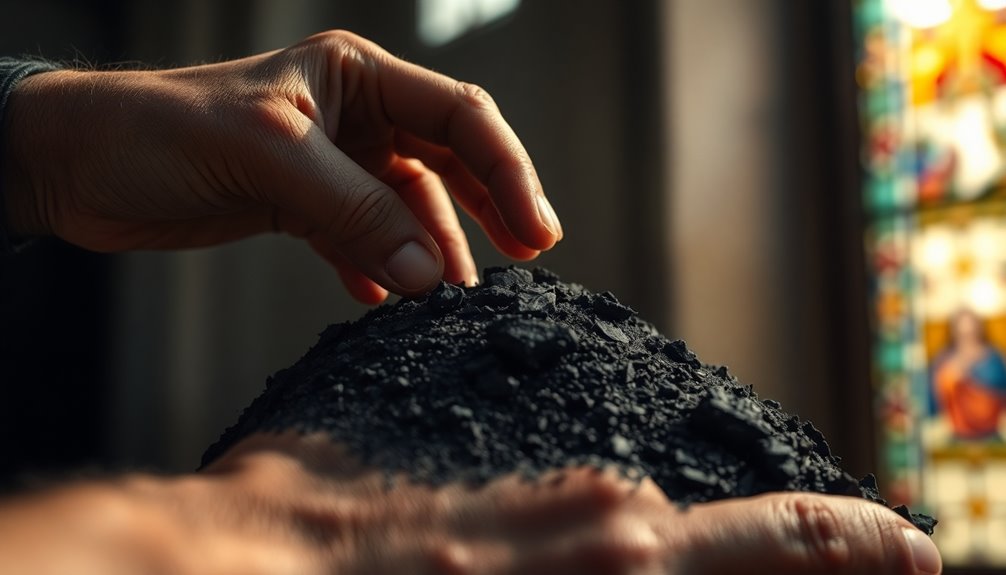Recurring symbolism in "The Fall of the House of Usher" creates an exciting web of meaning! The crumbling house symbolizes the mental and emotional decay of the Usher family. Roderick and Madeline's struggles reflect their isolation and despair. The dark atmosphere and eerie silence deepen the sense of entrapment. Also, Roderick's intense eyes and Madeline's haunting presence convey their inner turmoil. Each symbol fits perfectly, enhancing the story's Gothic feel. This mixture of decay, madness, and isolation helps you understand the characters better. If you keep exploring, you'll uncover even more fascinating details about this eerie tale!
Key Takeaways
- The House of Usher symbolizes the decay of the Usher family, reflecting their emotional and mental deterioration through its crumbling structure.
- Roderick Usher represents intellect and the mind's confinement, while Madeline embodies deep emotions, illustrating the duality of human experience.
- The prominent crack in the house foreshadows the Usher family's impending doom, symbolizing the fragility of their lineage.
- The oppressive atmosphere and isolation amplify the characters' despair, emphasizing the psychological impact of their environment on their mental states.
- Gothic imagery, including darkness and eerie silence, enhances themes of madness and entrapment, making the narrative a quintessential example of Gothic literature.
Overview of Recurring Symbolism
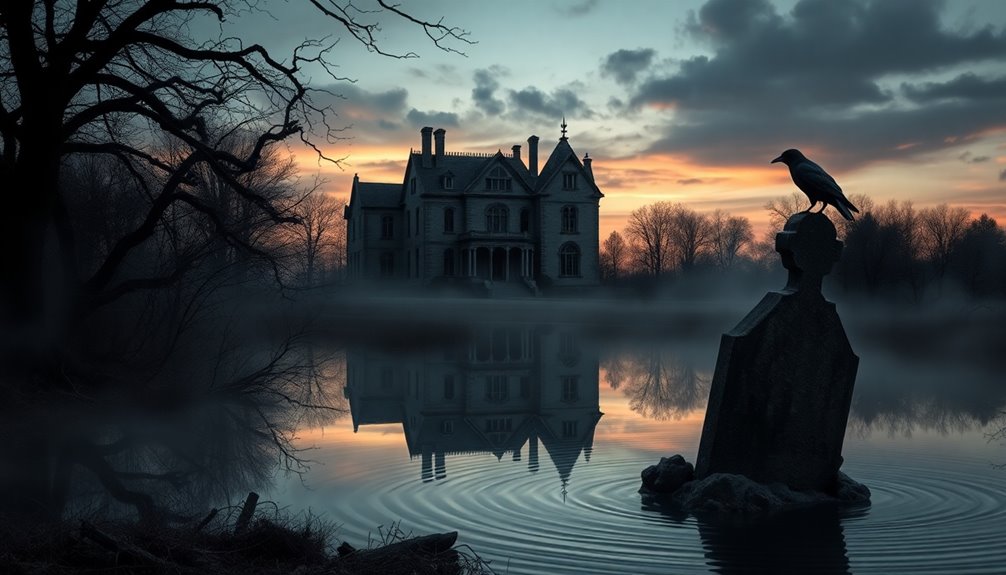
In the eerie landscape of "The Fall of the House of Usher," recurring symbolism plays an essential role in conveying deeper themes. The House of Usher itself is a powerful symbol, showing the physical and emotional decay of the Usher family. As you visualize its crumbling walls, think of how they mirror Roderick and Madeline Usher's deteriorating mental states. Their intertwined fates represent the struggle between intellect and emotion, creating a fascinating duality that you can't ignore.
You'll also find the dungeon serves as a metaphor for the subconscious mind. It represents the darkness and unfulfilled potential hidden within the characters. When storms roll in, they heighten the emotional turmoil and sense of doom, enhancing the gothic atmosphere surrounding the House of Usher.
Lastly, consider Roderick Usher's eyes, which symbolize perception and insight into his soul's condition. They suggest he's aware of his mental decline, making you ponder the complexity of his character.
As you explore these symbols, you'll uncover the rich layers of meaning that enhance your understanding of this haunting tale.
Symbolism of Characters

Roderick and Madeline Usher embody the complex interplay between intellect and emotion, making them pivotal symbols within the narrative. Roderick Usher represents the mind. He struggles with his own thoughts and fears, showing us how the mind can become a prison. Madeline, on the other hand, symbolizes deep feelings and intuition. She reveals the emotional depths we often hide. Their relationship highlights the duality of human experience, where Roderick's logic clashes with Madeline's emotional essence.
This internal conflict leads to their tragic fate, trapped in their ancestral home. When Madeline is entombed, it symbolizes the repression of emotions and thoughts. Ignoring feelings can have destructive consequences!
Here's a quick table to summarize their symbolism:
| Character | Symbolism | Significance |
|---|---|---|
| Roderick Usher | Intellect and reason | Represents the conscious struggles |
| Madeline Usher | Emotion and intuition | Embodies the depth of repressed feelings |
| Twin dynamic | Duality of human experience | Highlights interconnectedness of mind and heart |
| Immurement | Repression of emotions | Illustrates destructive consequences of ignoring inner life |
These symbols make the story rich and meaningful!
The House as a Symbol
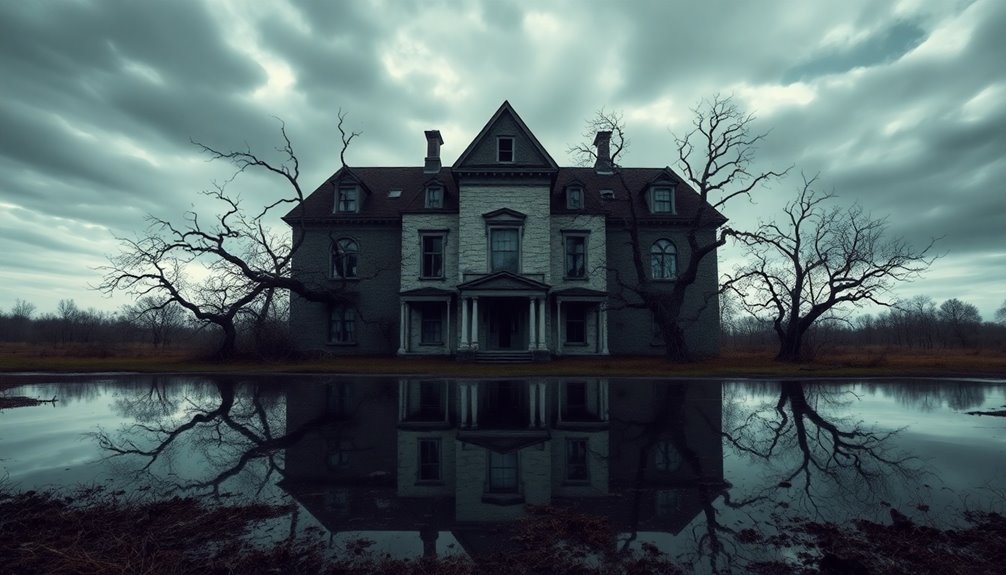
The House of Usher serves as a compelling symbol that mirrors the mental and emotional decay of its inhabitants. You can picture it with its crumbling walls and dark atmosphere, just like Roderick and Madeline Usher, who are trapped in their own despair. This house isn't just a building; it feels alive, reflecting the family's decline. The prominent crack in the facade stands out, hinting at the impending doom of both the Usher bloodline and their home. It's a clear sign of their psychological instability.
As you read, notice how the oppressive silence and gloom create an eerie sense of entrapment. This perfectly matches the isolation Roderick and Madeline feel, making their hopelessness even more palpable.
When the house finally collapses at the end, it serves as a powerful metaphor. It symbolizes the complete erasure of the Usher lineage, showing how decay triumphs over life.
In essence, the House of Ushers isn't just a backdrop; it's a character in its own right. It vividly illustrates the tragic downfall of a family consumed by madness, making their story all the more poignant.
The Dungeon's Significance

Exploring the dungeon in "The Fall of the House of Usher" reveals its deep symbolism, representing the emptiness and unfulfilled potential lurking within the human subconscious. This dark space is much more than just a creepy cellar; it connects to the maternal womb, symbolizing themes of birth, death, and the hidden truths within our minds.
When you reflect on the absence of light in the dungeon, it feels like a reflection of despair and hopelessness, mirroring Roderick's troubled mental state and the family's decline.
As the characters wander through the dungeon, they initiate a journey of inner exploration. This journey shows their psychological struggles and fears, making the dungeon a vital part of the story.
The eerie splendor of this place even hints that beauty can exist within darkness, illustrating the complex nature of hidden truths. In a way, the dungeon invites you to ponder the duality of human experience, where sadness and beauty often intertwine.
Eyes and Perception
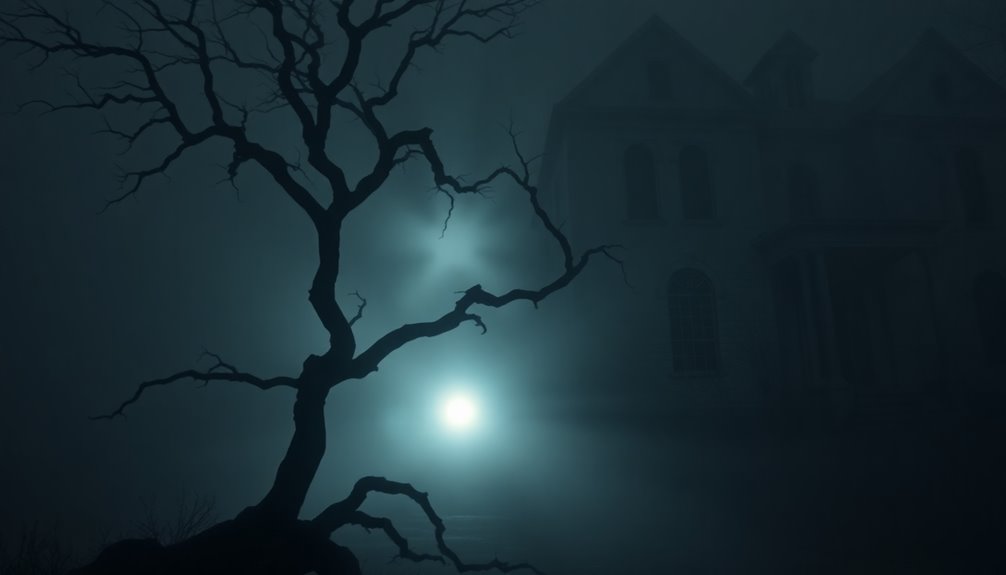
Frequently, the eyes in "The Fall of the House of Usher" serve as a powerful symbol of perception and emotional depth. Roderick Usher's luminous eyes show his heightened sensitivity. They give you insight into his fragile mental state and emotional turmoil. You can almost feel his awareness of his family's impending doom through his gaze.
The contrast between light and darkness in the descriptions of Roderick's eyes adds to the gothic atmosphere. It highlights themes of madness and isolation, making you curious about what he truly sees. His perceptive nature connects closely with the eerie surroundings of the Usher house. The house seems to respond to his feelings, showing that perception is deeply tied to the environment.
Eyes are a fascinating symbol in this story. They help you understand the characters' emotional struggles, revealing more than words can say. When Roderick looks at you, you can sense his despair and mental instability. This connection between subconscious power and perception suggests that Roderick's eyes may also reflect his deeper fears and desires, influencing the reality around him.
Nature and Supernatural Elements
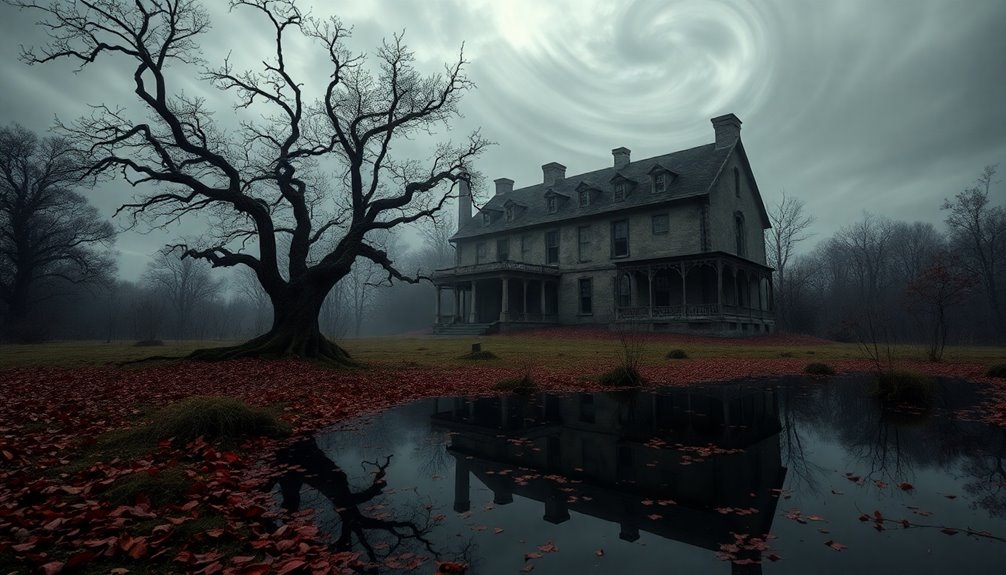
In "The Fall of the House of Usher," the house almost feels alive, with its cracks and decay reflecting the sadness of Roderick and Madeline.
The gloomy weather outside adds to this spooky vibe, showing how nature can mirror the characters' emotions.
As you read, notice how the eerie sounds and dark clouds create a sense of foreboding, reminding us that the supernatural often intertwines with the world around us.
House's Sentient Qualities
The House of Usher embodies a haunting blend of nature and supernatural elements, as it seems to possess almost sentient qualities that mirror the emotional states of its inhabitants. You can almost feel the house breathing, with its windows resembling eyes that watch the characters. This connection makes the house a character in its own right, reflecting Roderick and Madeline's struggles.
The architecture is distorted and decayed, almost as if it's suffering alongside them. Eerie sounds and strange atmospheres surround the house, suggesting a supernatural presence. This enhances the sense of dread you might feel while reading. The house responds to the emotional turmoil of Roderick and Madeline, amplifying themes of madness and isolation.
When the house finally collapses, it symbolizes the end of the Usher lineage. This moment marks the intertwining of nature and supernatural elements, showcasing how the house's fate is linked to its inhabitants.
Each creak and whisper adds to the story's rich tapestry, drawing you deeper into the eerie world of the Usher family. The house truly feels alive, making it an unforgettable part of this haunting tale.
Nature's Foreboding Presence
Surrounding the House of Usher, a desolate landscape looms, amplifying the story's sense of dread. As you explore, you notice decaying trees and a dreary atmosphere that reflect the emotional turmoil of the Usher family. The weather often matches the mood, with stormy skies and gloomy days. This oppressive setting enhances the feeling of despair and mirrors Roderick and Madeline's psychological states.
Look closely at the dark waters of the tarn. They act as a powerful metaphor for the depth of despair that the Usher family can't escape. Nature seems to connect with the house, almost as if the Usher mansion holds the spirits of its inhabitants. The walls echo their sorrow, creating a bond between the house and its surroundings.
As the story builds, a violent storm erupts, coinciding with the mansion's climactic collapse. This moment shows how nature's fury intertwines with the destruction of the Usher lineage.
The combination of these elements makes the setting feel alive, filled with foreboding and mystery. You can't help but feel the weight of nature's presence as it reflects the inner chaos of the characters, drawing you deeper into their story.
Themes of Madness and Isolation
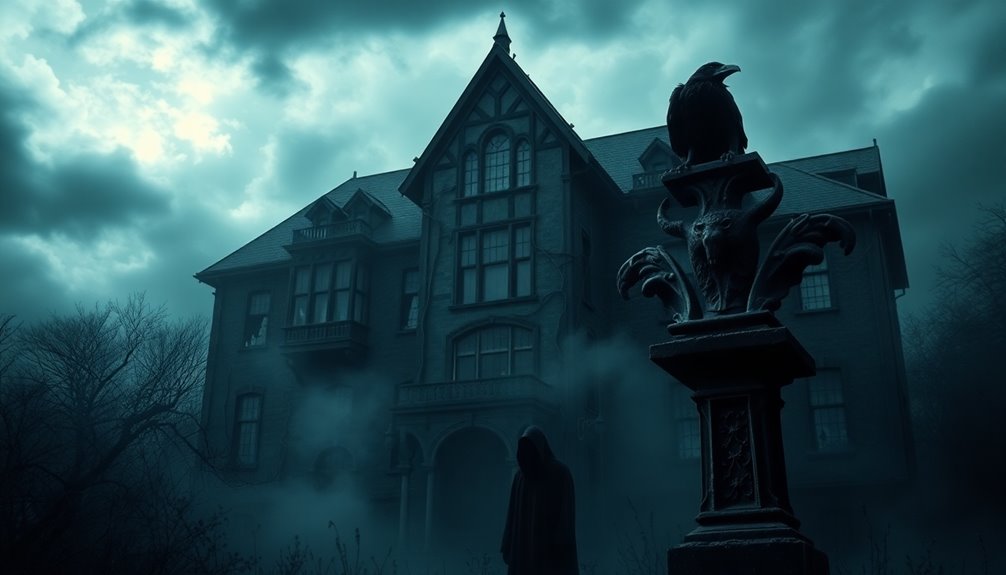
In "The Fall of the House of Usher," you'll notice how isolation affects Roderick Usher's mind in surprising ways.
His loneliness grows as the dark, eerie house wraps around him like a heavy blanket, making it hard for him to connect with anyone.
This connection between his environment and his madness shows just how powerful feelings of isolation can be!
Isolation's Psychological Effects
Throughout the narrative, Roderick Usher's isolation amplifies his psychological decline, transforming his home into a prison of the mind. You see, Roderick's deep solitude makes him feel more unstable. His crumbling house mirrors his emotions, showing how isolation can trap someone in despair. Without friends or support, Roderick's extreme sensitivity to his surroundings grows, causing him to feel even more anxious and fearful.
The heavy atmosphere of the Usher estate weighs down on him, making it harder to find hope or joy. This gloomy setting reinforces the story's Gothic elements, creating a sense of dread that pulls you in. Roderick isn't the only one affected; Madeline's entrapment in the house symbolizes how isolation can suffocate both physically and emotionally. In relationships, establishing healthy boundaries can help individuals maintain their well-being and avoid the pitfalls of isolation.
As you read, you might notice how isolation leads to madness. Roderick and Madeline are trapped in their own world, cut off from the outside. This shows that when people isolate themselves, they can lose touch with reality, leading to a downward spiral of despair. Furthermore, the consequences of such isolation can be likened to the effects of temporary alimony on individuals post-divorce, highlighting the financial and emotional strains that can arise from feeling trapped.
In the end, isolation shapes their tragic fate, reminding us of the importance of connection and community.
Madness and Environmental Influence
Madness often intertwines with the environment, as shown in "The Fall of the House of Usher." The Usher estate isn't just a backdrop; it's a character in its own right, mirroring Roderick's mental decline. You'll notice how the crumbling walls of the house reflect his descent into madness. Each crack and shadow seems to echo his troubled thoughts.
As you read, you can feel the heavy, oppressive atmosphere surrounding the estate. This gloominess adds to Roderick's isolation, making his psychological struggles even worse. He becomes more sensitive and paranoid, with the dark, soundless environment amplifying his despair.
You might see how the darkness and decay within the house parallel Roderick's feelings of loneliness. The story shows how our surroundings can greatly affect our internal feelings. The haunting presence of the Usher house mirrors Roderick's chaotic mind and deep isolation. Additionally, the design elements of the estate, such as its natural materials and craftsmanship, contribute to its eerie atmosphere and reflect the characters' inner turmoil.
It's a powerful reminder that where we live can influence our emotions and thoughts. By exploring these themes, you can appreciate the connection between madness and environmental influence in a whole new way!
The Role of Decay
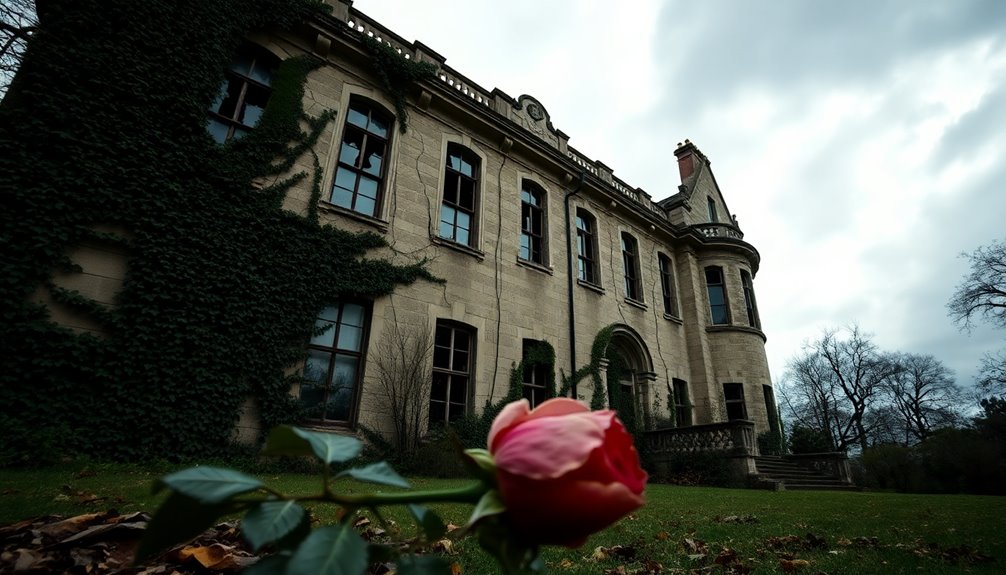
Decay weaves itself into the very fabric of "The Fall of the House of Usher," serving as a powerful symbol of the emotional and mental unraveling of its characters.
The crumbling walls of the Usher home mirror the fragile state of Roderick and Madeline Usher. As the house deteriorates, you can feel the sense of hopelessness that surrounds them. It's as if the decay of the structure reflects their troubled feelings and unstable minds.
The dark and oppressive atmosphere adds to this feeling of despair. The crack in the house's facade foreshadows the doom that awaits the Usher family.
It's a reminder that nothing lasts forever, and every family has its struggles. The decay you see in the house highlights the decline of the Usher bloodline, reminding us of the connection between physical spaces and the people who inhabit them.
Impact on Gothic Literature

The symbolism in "The Fall of the House of Usher" not only reflects the inner turmoil of its characters but also leaves a lasting impact on Gothic literature as a whole. This story explores deeply into the connection between mental states and physical surroundings. The decaying Usher house stands as a strong symbol of despair and decay. It mirrors the physical deterioration of Roderick and Madeline Usher. As their mental health declines, the house crumbles around them.
Poe's use of dark imagery creates an eerie atmosphere that pulls you in. You can feel the tension and foreboding, typical of Gothic storytelling. The crack in the house's facade shows how fragile sanity can be, highlighting themes of madness and isolation. These ideas resonate throughout the genre, influencing other writers.
The blend of supernatural elements with the house's symbolism emphasizes feelings of entrapment and inevitability. This powerful mix solidifies Poe's influence on Gothic literature. By exploring these themes, he paved the way for future authors to investigate into similar dark and mysterious worlds.
Analysis of Key Imagery

In "The Fall of the House of Usher," the house itself feels like a character, showing us the decay and despair of its owners.
You can almost sense the crumbling walls echoing Roderick's troubled mind.
Through stormy skies and dark dungeons, Poe paints a vivid picture of gothic imagery that captures the deep emotions of fear and hopelessness.
House as Character
Various descriptions of the House of Usher reveal its human-like qualities, transforming it into a character that embodies the psychological turmoil of its inhabitants. You can almost feel the house breathing with its "dull, dark, and soundless" presence. This eerie atmosphere mirrors Roderick Usher's own mental struggles, making the house a true character in the story.
The crumbling architecture, especially the crack in the facade, symbolizes Roderick's instability, hinting at the eventual downfall of both the house and the Usher family.
As you explore the oppressive silence and darkness within the house, you sense the isolation that weighs heavily on Roderick and his sister, Madeline. Their struggles are closely tied to the physical decay of their home. The house feels alive, reflecting the deep connection between the Usher family and their ancestral dwelling.
When the house ultimately crumbles, it's not just a building that falls; it represents the end of the Usher lineage. This climax highlights the triumph of decay over life, reinforcing the gothic themes of death and despair. The House of Usher truly becomes a character in its own right, echoing the fate of its doomed inhabitants.
Decay and Despair
Decay and despair permeate every corner of the House of Usher, serving as a chilling backdrop to the psychological unraveling of Roderick and Madeline. The crumbling walls and dark atmosphere symbolize their emotional decline, reflecting how their health and sanity fade away. As you read, you can almost feel the hopelessness surrounding them, like a thick fog.
Here's a quick look at some key imagery for you:
| Imagery | Description | Symbolism |
|---|---|---|
| Crumbling walls | Represents the physical decay of the Usher family | Mirrors Roderick and Madeline's decline |
| Dark atmosphere | Creates a sense of isolation and despair | Highlights their mental struggles |
| Crack in the facade | Foreshadows the family's ultimate demise | Showcases the fragility of their lineage |
This decay is more than just a backdrop; it's a powerful metaphor for the Usher family's legacy. The house, dull and soundless, reinforces their isolation. As you explore these elements, you can see how the physical environment directly influences the characters' emotional states, creating a haunting tale of despair.
Gothic Imagery Analysis
Gothic imagery consistently shapes the haunting atmosphere of *The Fall of the House of Usher*, drawing readers into a world steeped in despair and madness. This rich imagery paints a vivid picture that helps you feel the story's chilling emotions.
Here are some key images you might notice:
- The Usher house is described as "dull, dark, and soundless."
- Crumbling walls and decaying architecture symbolize the family's decline.
- The oppressive darkness enhances themes of despair found in Gothic literature.
- Roderick Usher's luminous eyes shine brightly against the gloom.
- The eerie silence unnerves you, amplifying the characters' isolation.
As you explore these images, you can feel the weight of Roderick's mental struggles and the family's tragic fate. The decaying house mirrors their inner turmoil, creating a connection between the setting and the characters.
This powerful imagery makes you think about how darkness and despair affect them. Gothic literature often uses such striking images to evoke deep emotions, and Poe masterfully achieves this throughout his story.
Frequently Asked Questions
What Are Examples of Symbolism in the Fall of the House of Usher?
In "The Fall of the House of Usher," you can find fascinating symbols! The crumbling mansion represents the mental decline of Roderick and Madeline Usher. A crack in the house shows their hidden instability.
The dark dungeon symbolizes despair and lost dreams. Roderick's bright eyes contrast with the gloom around him, highlighting his sensitivity.
Finally, the house's collapse signifies the end of the Usher family, showcasing themes of decay and death. How intriguing, right?
What Is the Symbolism for the House Falling Down at the End of the Story?
You know the saying, "What goes up must come down"?
The house falling at the end symbolizes the end of the Usher family's legacy. It shows how Roderick and Madeline's minds and spirits have crumbled, just like the house itself.
This collapse represents despair and the inescapable nature of decay. As you read, you can feel the weight of their isolation and madness, reminding you that everything can change in an instant.
What Do the Twins Symbolize in the Fall of the House of Usher?
In "The Fall of the House of Usher," the twins, Roderick and Madeline, symbolize the complex relationship between the mind and body.
You'll notice how Roderick's sharp intellect contrasts with Madeline's failing health. Their connection shows how emotions can be hidden away, just like Madeline is immured.
When she returns, it highlights the clash of repressed feelings. Their tragic fate reminds us that our struggles are often intertwined, impacting one another deeply.
What Does the Weather Symbolize in the Fall of the House of Usher?
In "The Fall of the House of Usher," the weather's mood swings mirror the characters' feelings.
On sunny days, you might feel hope, but when storms roll in, dread fills the air. This contrast shows how Roderick Usher's mind is troubled, with gloomy skies reflecting his despair.
The weather isn't just background; it connects nature to the Usher family's struggles, making the story even more thrilling and eerie!
Conclusion
In "The Fall of the House of Usher," the symbols come alive like colorful butterflies, each revealing a deeper meaning. The house, with its crumbling walls, shows us the weight of history and decay, while the characters' struggles reflect our own fears of madness and loneliness. As you explore these symbols, think of them as a treasure map leading you through Edgar Allan Poe's mysterious world. Every clue brings excitement and understanding, making the journey unforgettable!











